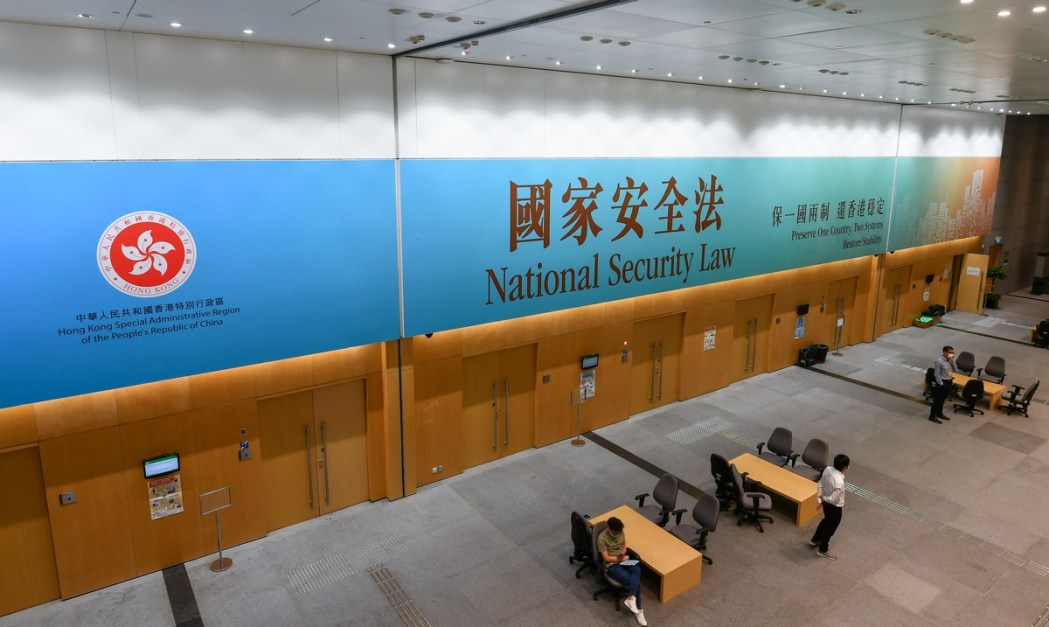A pro-Beijing heavyweight has said it would not be suitable to begin legislative work to enact Hong Kong’s own security law this year, citing the city’s need for post-pandemic recovery and the run-up to Taiwan presidential elections.

In an editorial published in local newspaper Ming Pao on Monday, Lo Man-tuen, the vice-chairperson of Communist Party organisation All-China Federation of Returned Overseas Chinese, said that there was “no big urgency” for Article 23 as Hong Kong already has the protection of Beijing’s national security law.
“[Article 23] can be planned slowly and carefully,” Lo said.
Article 23 of the Basic Law, Hong Kong’s mini-constitution, stipulates that the government shall enact laws to prohibit seven types of offenses – treason; secession; sedition; subversion against the central government; theft of state secrets; foreign bodies’ conducting of political activities in the city and local bodies establishing ties with foreign bodies.

It is different from Beijing’s national security law, which was enacted in the wake of months-long unrest in 2019 and criminalises subversion, secession, terrorism and foreign collusion.
Secretary for Security Chris Tang said previously that Article 23 was needed to plug “gaps” in Beijing’s security legislation. Last May, he said public consultation was supposed to have begun in the first half of last year, but that it had been delayed due to Covid-19.
In the editorial, Lo wrote that as Covid-19 recedes and international borders reopen, Hong Kong must “catch up quickly and race against time to regain lost opportunities.”
“This is Hong Kong’s most urgent task, and is also citizens’ biggest wish,” he said. “Things with controversy can be paused for the moment.”

He added that as China restarts engagement with other countries, Hong Kong needs to present its “advantages and potential” to the world.
“[Hong Kong should] not hastily use its half-focused energy to deal with the controversy that arises from beginning legislative work for Article 23,” Lo said.
‘Rapidly changing international order’
Lo also said the timing of Taiwan’s presidential elections – which will be held in early 2024 – also made this year unsuitable for kickstarting legislative procedures for Hong Kong’s local security law.
In the later half of this year, Lo said, Taiwan would enter a “sensitive period” as campaigning heats up.
Hong Kong’s commencing of Article 23 legislative work could give the Democratic Progressive Party (DPP), the party of incumbent president Tsai Ing-wen which takes a more critical stance on Beijing’s policies than its major opposition, ammunition to “fool the island’s public and cheat votes.”

“This is absolutely not a situation we can allow,” Lo wrote, adding that the US and the DPP were “colluding” to advocate for Taiwanese independence.
“[Additionally], the world is undergoing change unseen in a century,” he said, citing the war between Russia and Ukraine and the “rapidly changing international order.”
“Time is needed to carefully plan the relevant legislation… that would be safer.”
Chief Executive John Lee said last April – ahead of his uncontested election as the city’s leader – that legislating Hong Kong’s security law was a “priority.”
Tang said last month the security law would be enacted next year at the latest.
Support HKFP | Policies & Ethics | Error/typo? | Contact Us | Newsletter | Transparency & Annual Report | Apps
Help safeguard press freedom & keep HKFP free for all readers by supporting our team

LATEST FROM HKFP
HKFP has an impartial stance, transparent funding, and balanced coverage guided by an Ethics Code and Corrections Policy.
Support press freedom & help us surpass 1,000 monthly Patrons: 100% independent, governed by an ethics code & not-for-profit.










